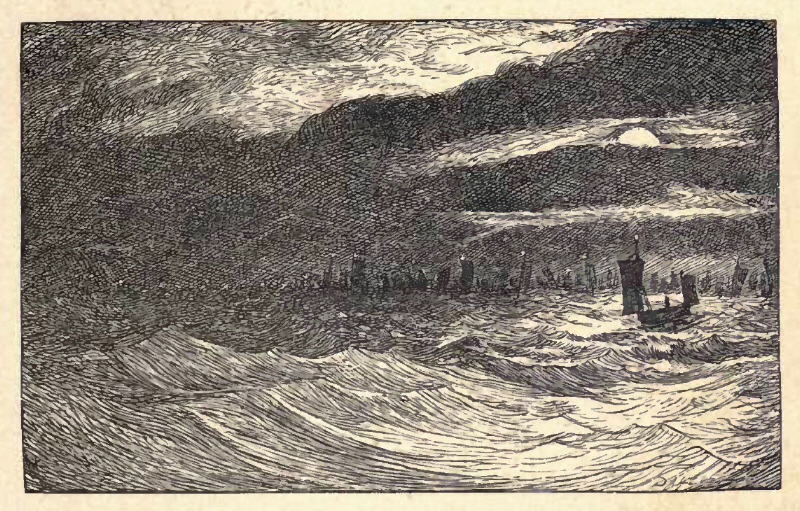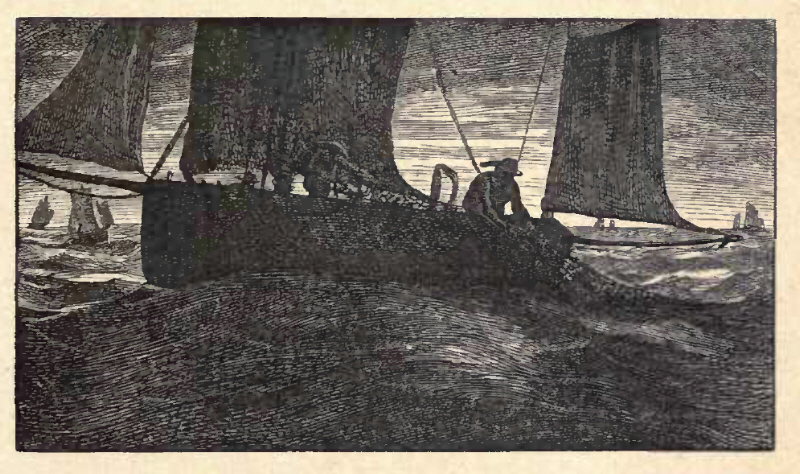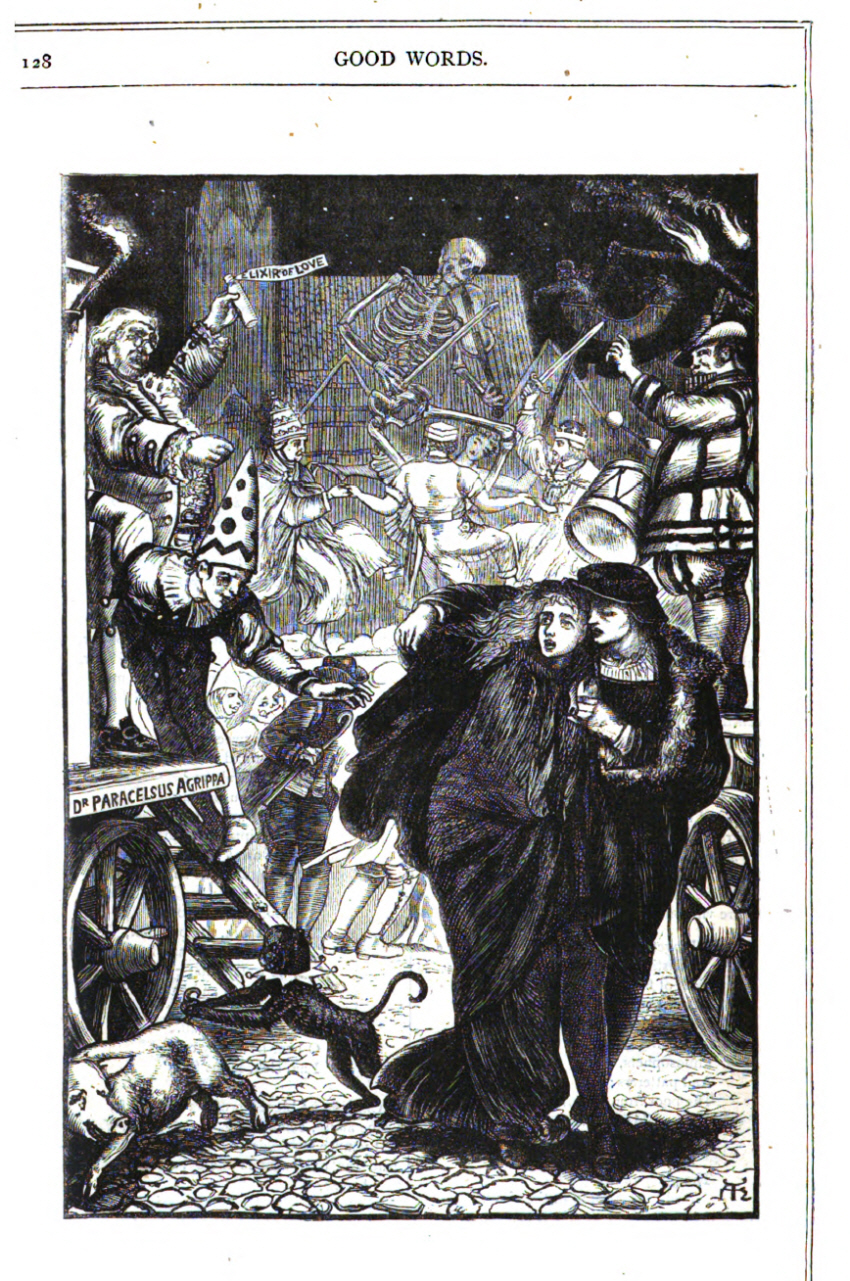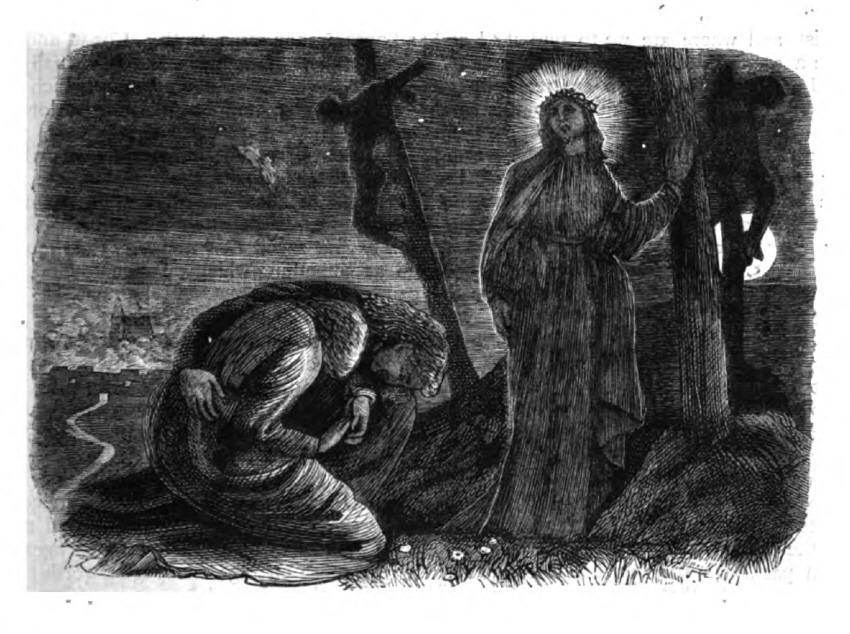|
His heart is heavy, his lips are set,
He sighs as he draggeth in his net;
The dawning brightens, the water screams,
And the white face gleams!
’Tis chill, so chill, as he shoreward flies;
The boat is laden, the new-born cries,—
But the wraith of the mother fades far away
In the morning grey!
Robert Buchanan.
* Wraith, the apparition of one on the point of death.
Back to ‘The Fisherman’ in Ballads of Life, Love, and Humour.
_____
VANITY FAIR - first version
Good Words (February, 1872)
VANITY FAIR.
HERE’S a babble
In Vanity Fair!
Here’s a rabble
Of folk on the stare!
Here’s a crying,
Selling and buying,
Groaning and grumbling,
Pushing and stumbling!
Tootle-te-toot!
Rum-ti-tum-tum!
They blow the flute,
And they beat the drum.
And yonder in rows
Are the painted shows,
Where zany and clown
With “Walk in, walk in!”
Stalk up and down,
While the people grin.
Hold me tighter, my pretty one,
We’ll elbow our way and see the fun.
In we go, where they scramble and scream—
What a rabble! it’s like a dream!
Here is old
Aunt Sal in a corner—
Crimson and gold
Rags adorn her.
How droll looks she,
With her rusty Key!
In spite of all shying
There’s Mitre and Crown,
And none are trying
To knock them down.
The game was hearty
In days gone by,
But now no party
Cares for a shy.
Don’t be downcast, my grey-hair’d lad—
Here’s a copper since trade is bad.
Try, my man of melancholy,
To pocket pence by some other folly.
Carry the poor old Pope elsewhere,
She only spoils the fun of the Fair.
On we go,
Through the rabble straying. . .
Here’s a show
Where things seem paying!
See the creature
Painted there—
Wild of feature
Covered with hair:—
The Missing Link
Between Monkey and Mortal!
Chink-a-clink
Go the pence at the portal;
But look at the folk
Who out are stumbling—
Some full of a joke,
Some audibly grumbling.
Here’s a fellow—
We’ll speak to him:
His face looks yellow
And dark and grim:
Clari, you hear him? a swindle, is it?
A hocus-pocus! not worth a visit!
This is a Yankee, and in he went,
And recognised, to his wonderment,
In the “Missing Link to be seen for a Cent”
The last—American President!
Trip it merrily,
Pretty one,
On we stray cheerily
Full of the fun:
Punch and Judy;
Fiddlestring;
Acrobats moody
Making a ring;
Clowns cutting capers
At every show;
Bucolic gapers
Grinning below;
Quiet conjurers quick and sly
Making the public halfpence fly;
Quacks with boluses, nostrums, and pills,
Vending cures for the flesh and its ills;
Every one bawling—(O the din!)
Every voice calling—“Walk in, walk in.”
“Stop the thief!”—how they carry the shout!
How the crowd eddies in and out!
Lean and thin with quivering lip
The rascal writhes in that fat man’s grip:
He looks all round with a hungry stare;
The mob groans round him and longs to tear—
Off to the gaol the scarecrow bear!
We’re virtuous people in Vanity Fair!
All together,
Christian and Jew,
Birds of fine feather,
And ragged too,
Dukes and earls,
And ballet girls,
Philosophers,
And patterers;
The poor from the city,
The wild sea-rover,
The beggar witty
Half-seas over,
The gipsy pretty
Red from a romp in the clover.
Right foot, light foot, we trip it and toe it,
You the pretty girl, I your poet,
Rubbing sleeves with great and small,
Jostling along through the heart of them all.
Our hearts are leaping, our heads are dizzy,
The trade’s so merry, the mirth so busy,
We sqùeeze along and we gasp for air,
In the hurry and flurry of Vanity Fair.
Stop, my dear!
How the trumpets blow!
What have we here?
Why, the great French show!
O paint and padding!
With what an air
They are promenading
Outside, up there—
Zany and hero
(Birds of a feather),
Scapin and Nero
Grinning together;
Spanish gipsy
With tambourine;
Gaoler tipsy,
And proud-faced Queen,—
And overhead,
Painted blood-red,
The jolly old Guillotine!
See that fellow in tatters and rags—
His cry to the people never flags;
Poor though he is, and dirty, and low,
He seems the master of the show.
“O yes,” he cries, with a voice of power,
“Drama and pantomime every half hour,
And at each performance, trust to me,
A change of the total Companie!”
* * * *
Clari, my sweetest,
Trimmest and neatest,
Why this alarm?
Why are you sighing,
Fluttering and crying,
And gripping my arm?
“Come away! come away!
’Tis so sad! ’tis so loud!
My heart aches, my head aches
To look at the crowd.
The mad folk, the bad folk,
The poor folk, the sad folk,
Like waters that call,
Their sadness and badness
Are strange, but their gladness
Is strangest of all.
O hear how they cry—
I am sick, let us fly!”
O Clari, sweet blending of fire and of air,
Come along, come along, out of Vanity Fair.
Out yonder are fields and the sky and the trees—
And the only sounds there are the birds and the breeze,
And the water that beats in its green woodland nest
Like the heart that is beating so loud in your breast.
|



